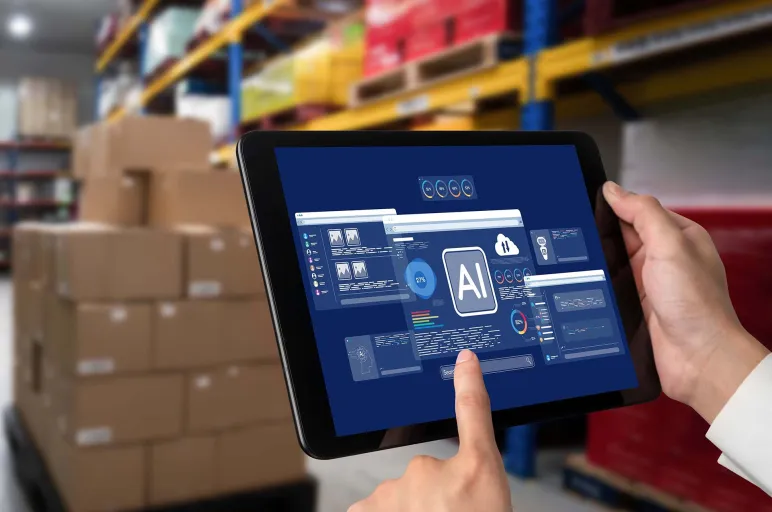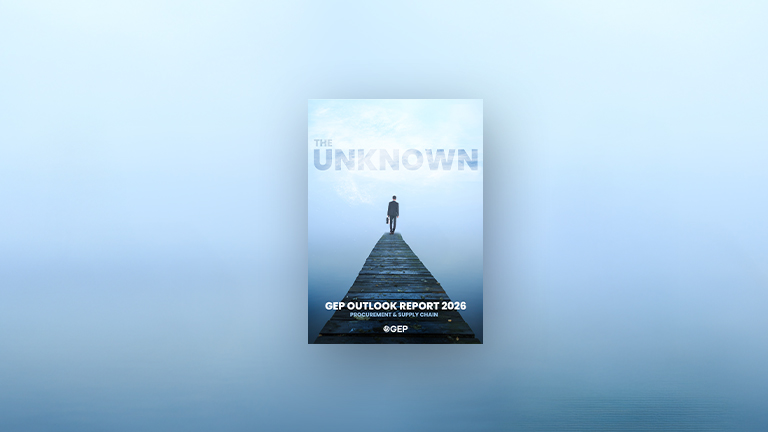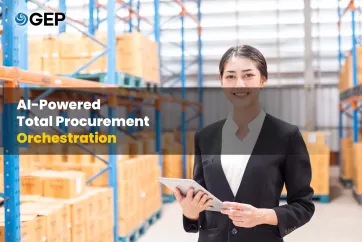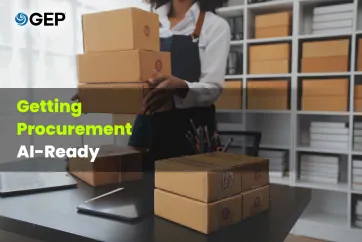
Why Fixing Data Gaps is Vital to Leveraging AI in Procurement
- Many executives have identified AI use cases for procurement but haven’t scaled them yet.
- Leading companies are investing in data platforms to unlock AI’s full potential.
- Without clean, connected data, even the best AI tools will fail to deliver meaningful results.
August 12, 2025 | Procurement Software 4 minutes read
What are procurement leaders doing to make the best use of AI?
As AI continues to dominate procurement discussions, leaders recognize the huge potential to cut costs, reduce risk, and increase efficiency.
But what stands in their way and is stopping them from realizing these benefits?
AI can’t deliver results if the data is poor. Before companies scale AI, they need to fix their data foundation.
Interest is High, but Data is Holding Things Back
Many procurement teams are still in the early stages of their AI journey. A ProcureCon CPO Report notes that 82% of executives have identified or prioritized specific AI use cases for procurement. But most are not yet making the best use of AI.
One key barrier is data that is often fragmented across systems, reveals a recent Harvard Business Review report. Many organizations still rely on manual processes or outdated systems. This creates gaps and errors that weaken AI results.
The key issue is not a lack of data. The data is scattered, inconsistent, and often outdated. AI models cannot produce strong results when they are trained on weak or incomplete information.
Amy Fong, a partner at Everest Group, explains the challenge: procurement does not control most of the data it relies on. Much of it comes from suppliers, internal teams, or the market. That makes data integration a major hurdle.
Jan Olesen, global head of digital business solutions at Indorama Ventures, agrees: “Without the data, the best AI won’t work.” His team started by making data readiness the top priority, then moved quickly to scale the results.
How Leading Companies Are Solving Data Challenges
IHG Hotels & Resorts and Indorama Ventures have taken clear steps to address potential data roadblocks.
IHG began with a spend intelligence platform that utilized AI to classify global purchases. They now have a unified data environment that consolidates supplier, contract, ESG, and risk data. This provides a clear view of operations and supports AI across the entire procurement process.
Indorama focuses on building the right foundation. Their teams identified essential data, filled in the gaps, and started deploying AI in sourcing, contracting, and supplier evaluation. Rather than wait for perfect conditions, they chose to move fast and refine as they went.
Both companies collaborated closely with technology partners to identify key data, align their systems, and develop usable platforms. That allowed them to start generating value early.
Optimizing Cost, Speed, and Resilience Through AI-Enabled Procurement
Learn how leading companies are embedding AI across procurement and seeing real results
Moving From Automation to Insight
AI is helping teams work smarter, not just faster.
At IHG, contract generation is now done in real time using generative AI. Legal and procurement teams save time and reduce back-and-forth reviews. The company also utilizes AI to identify new suppliers, monitor ESG performance, and forecast future demand.
Sopan Shah, IHG’s global CPO, calls this a “force multiplier.” AI lets a small team do much more without adding staff. It turns complex supplier data into clear insights that help guide decisions.
The benefits go beyond productivity. AI gives procurement a stronger voice in business strategy. With enriched data, teams can show the full picture of supplier risk, performance, and sustainability. That makes procurement a key part of value creation, not just cost control.
Indorama is taking a similar approach. Their teams use AI to evaluate sourcing options, simulate disruption scenarios, and score supplier performance. The goal is to support better, faster decisions that lead to stronger outcomes.
Getting People Onboard
While data is critical, people also need to be ready for AI. This makes training and change management critical.
IHG uses a “train the trainer” model. Early adopters learn the technology and then teach others how to use it in daily tasks. Indorama takes a hands-on approach. Employees are encouraged to explore the tools and then receive guidance on best practices.
Leadership plays a central role. IHG has created a digital procurement team that brings together process experts and technologists. This group examines the entire process, not just isolated fixes. Their goal is to ensure that each technology choice supports long-term goals.
Fong suggests starting with small, high-impact use cases. Many tech tools already include AI features. Some companies just need to activate or optimize what they already have.
Clean, Connected Data Will Power Next-Gen Procurement
Organizations that treat data as a strategic asset will be best positioned to scale AI in the future. Looking ahead, procurement leaders have a rare opportunity. AI is not only advancing quickly, but it is also becoming more accessible.
As organizations modernize their data foundation, they will unlock the ability to shift from reactive problem-solving to proactive, insight-driven leadership.
Intelligent agents, real-time decision-making, and automated execution will shape the next wave of procurement transformation.
Clean, connected data will power that shift, and organizations that invest in it now will lead the industry tomorrow.
AI will not just enhance what procurement teams do. It will redefine how procurement operates. The future belongs to those ready to build for it today.



